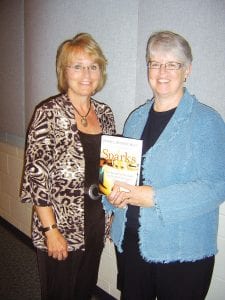Follow your bliss and the
universe will open doors for you
where there were only walls.
– Joseph Campbell
The challenge to help students find their bliss was given to ISD166 staff on September 1 at a Search Institute workshop called “Sparks.” The training was based on research by Search Institute President and CEO Peter L. Benson, Ph.D., and his subsequent book entitled Sparks: How Parents Can Help
Ignite the Hidden Strengths of
Teens.
According to Benson’s research, teens who discover their “sparks,” or factors that motivate them, and are encouraged to pursue them by caring adults, earn higher grades, have better school attendance, are more likely to be physically healthy and socially competent, and are less likely to be depressed or violent.
The research involved polls of 3,000 12-17-year-olds and interviews with more than 400 teens ages 15-17. Adolescents’ sparks tend to fall into three main categories: talents or skills, topics or issues they care deeply about, or ways they believe they can positively contribute to the world. Sixty-nine percent of the students researched could identify at least one of their sparks.
“The nurturing of sparks in adolescence is so critical,” Peter Benson says, “especially today, when so many adolescents are already jaded and bored with life and blind to their own promise. It’s important to keep the flame alive – for the individual and for the benefit of society as a whole.”
The10 most common sparks among American teenagers are creative arts, athletics, academics, reading, helping others, spirituality or religion, nature and the environment, developing life values such as joy, tolerance, or caring, supporting animal welfare, and leadership.
Leading the workshop at ISD166 were two trainers from the Search Institute, a Minneapolis-based nonprofit devoted to developing healthy communities for kids. Senior Consultant Nancy Tellett-Royce gave the audience some pointers on how to help kids develop their sparks. “A kid can be passionate about something and not be very good at it,” she said. She urged them to not discourage kids from pursuing what they really want to do. We cannot predict whether they will succeed or not, she said. Some people without a natural talent for something become proficient at it simply by persevering. “I strongly encourage you not to tell a kid, especially when they’re younger, that they’re not good at it or that they won’t succeed,” she said.
Some kids find their sparks early on and continue to pursue them. Others take much more time to discover their sparks, or their sparks change as they continue to grow. A spark does not have to become a person’s life work in order to be a valuable part of his or her life.
Senior Trainer Marilyn Peplau pointed out the importance of supportive adults in helping kids find and pursue their sparks. “Kids are willing to work very hard for people they have a connection with,” she said. Encouraging kids to explore a variety of interests can be very helpful.
According to a Search Institute brochure on Sparks, “A few people seem to know their spark from an early age, but for most of us, our spark is revealed or discovered over time, through many opportunities and experiences, and we often need caring adults to point them out as we grow from ages 10 to 20. …Any adult helping a young person find and nurture his or her spark is helping not only that young person, but also potentially the whole community.”
According to Benson, “When young people find their spark and their center, their lives becomes generous, committed, passionate, purposeful, and responsible.”
To help young people find their passion is to help them find themselves, and the encouragement of caring adults can be critical. After all, according to e.e. cummings, “It takes courage to grow up to be who you really are.”
More information can be found at www.IgniteSparks.org. A spark-finder quiz for teens can be found at www.at15.com. The Search Institute website is www.search-institute.org.



Loading Comments